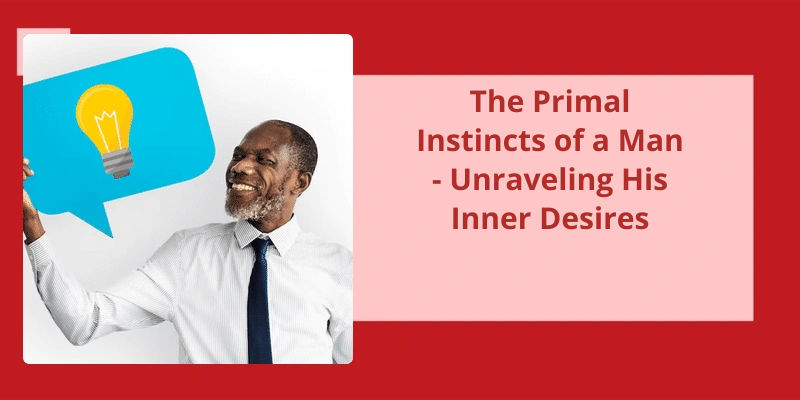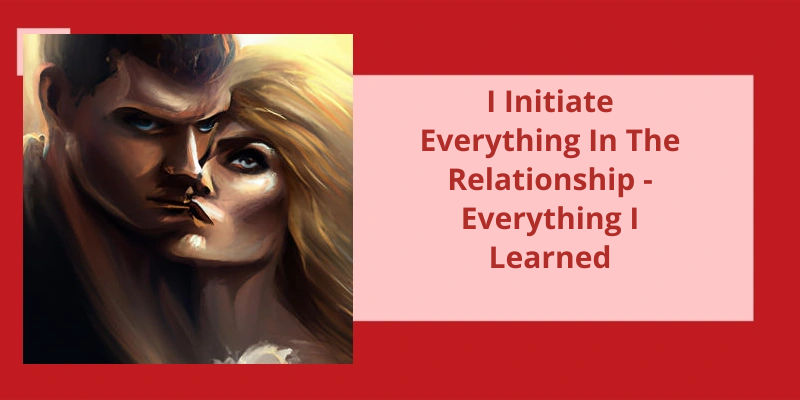"The Primal Instincts of a Man: Unraveling His Inner Desires" delves into the intriguing phenomenon known as the hero instinct, a powerful force that resides deep within the core of every man. This enigmatic aspect of a man's psyche lies at the heart of his innate desire to feel essential and valuable to his romantic partner. Rooted in evolutionary psychology, the hero instinct stems from a primal urge to provide and protect loved ones, a biological imperative that’s been ingrained in men since time immemorial. Expanding our understanding of this primal instinct, this exploration highlights the specific actions and behaviors that can awaken and nurture a man's hero instinct, paving the way for a more fulfilling and harmonious relationship.
What Are Some Primal Instincts?
The primal instincts of a man encapsulate a fascinating blend of innate drives and desires that have evolved over thousands of years. These instincts, deeply rooted within their biology, encompass a range of basic urges that shape their behavior and responses to the world around them. Survival, undoubtedly, stands as one of the most primal instincts, urging men to protect themselves and their loved ones from harm. This instinct manifests as a heightened awareness of potential threats and an instinctive fight-or-flight response.
Another prominent primal instinct is the pursuit of sustenance. The primal desire for food drives men to seek out nourishment to sustain their bodies and maintain optimal health. This instinct, intertwined with their evolutionary development, compels men to explore, hunt, and gather resources to satisfy their primary needs. Moreover, the instinctual drive for shelter ties into this pursuit, as it represents the urge to secure a safe and comfortable environment for themselves and their families to thrive.
The primal instinct of reproduction occupies a central position in a mans inner desires. Deep within their DNA lies an instinctual drive to procreate and pass on their genetic material. This instinct shapes their pursuit of mates, their desire for intimacy, and their quest for an enduring bond with a suitable partner. Coupled with this primal instinct is the innate need for companionship and social connection, as humans are inherently social beings seeking affiliation and acceptance.
Additionally, the primal instincts of men are closely intertwined with their competitive nature. The instinct to strive for dominance, success, and power forms an integral part of their inner desires. It compels them to assert themselves, exhibit physical strength, and establish their position within social hierarchies. This instinctual drive for conquest not only fuels ambition but also shapes their interactions and relationships with others.
Jaan Panskepp, a radical neuroscientist, has identified seven ancient instincts that drive human behavior. These instincts, also known as “primary-process affective systems,” include seeking, anger, fear, panic-grief, care, pleasure/lust, and play. Surprisingly, the most powerful instinct among these is believed to be “seeking.”
What Are the Basic Instincts of Human Life?
The primal instincts of a man are deeply rooted within his psyche, unveiling a complex web of desires that shape his every action. At the core of these instincts lies the concept of seeking, which drives the human spirit to constantly strive for more. This insatiable need for exploration and discovery fuels the adventurer within, pushing him to explore new horizons and conquer uncharted territories. Seeking is the key to unlocking knowledge, fulfillment, and a sense of purpose in the vast expanse of life.
Another fundamental instinct is anger, a force that surges through a mans veins when his boundaries are crossed or his values are jeopardized. It’s a fiery intensity that can either be destructive or serve as a catalyst for change. Anger empowers him to defend what he holds dear, asserting his presence in a world that sometimes requires a fierce stance.
Fear, too, plays a crucial role in the primal instincts of a man. It’s an ancient survival mechanism that helps him navigate the treacherous realms of the unknown. Fear keeps him cautious, constantly scanning his surroundings for potential threats. It’s a reminder of his vulnerability and a signal to remain vigilant in a world that can be both beautiful and merciless.
Panic-grief, a complex blend of primal emotions, emerges in times of loss and despair. It’s a storm of anguish that consumes a man when faced with heart-wrenching circumstances. Panicked and grieving, he searches for solace and meaning amidst the chaos, seeking to make peace with the inevitable transience of life.
On the other hand, care emerges as a tender instinct, highlighting a mans ability to nurture and protect. It’s the instinct that drives a man to care for others, to offer support and solace. Care allows him to forge deep connections and create a sense of belonging in a world that can often feel fragmented.
Lastly, the primal instincts of a man unravel a labyrinthine desire for pleasure and lust. This instinct is a vessel of raw, primal energy, urging him towards sensory experiences that elicit pleasure and desire. It’s a force that amplifies lifes intensity, driving him to indulge in the realms of passion, love, and sensuality.
Jaan Panksepps identification of the seven ancient instincts sheds light on the intricate tapestry of desires that shape a mans existence. From the insatiable drive of seeking to the fiery intensity of anger, fears cautious whisper to the tender embrace of care, and the tantalizing allure of pleasure and lust, these instincts weave together the essence of mans primal nature.
The Instinct of Self-Preservation and Survival: Explore How Humans Are Wired to Protect Themselves and Their Loved Ones, and How This Instinct Is Manifested in Various Situations.
Humans are inherently wired with a primal instinct of self-preservation and survival. This instinct drives individuals to take actions that protect themselves and their loved ones from harm or danger. It’s a natural response that’s deeply rooted in our evolutionary history.
This instinct is manifested in various situations, such as when we exhibit fight or flight responses when encountering threats. When faced with danger, our bodies release adrenaline, which heightens our senses and prepares us to either confront the danger or flee from it.
Furthermore, humans tend to prioritize the safety and well-being of their loved ones. This can be seen in the lengths we go to protect our families and provide for their needs. It drives us to make sacrifices, take risks, and act in ways that ensure their security.
The instinct of self-preservation and survival also influences our decision-making processes. We’re more likely to prioritize our own needs and interests when it comes to survival and security. It can lead to competition for resources and the formation of social hierarchies.
In summary, the primal instinct of self-preservation and survival is deeply ingrained within humans. It influences our behaviors, reactions, and decision-making processes, as we’re driven to protect ourselves and our loved ones from harm.
Creating a deep and strong bond with your man involves triggering his innate hero instinct. When you ask him for help, allow him to protect you, and express love, appreciation, and enthusiasm for him, you activate this powerful instinct. By doing so, you provide him with the fulfilment and sense of purpose he craves, solidifying his active role in the relationship.
What Triggers a Man’s Deepest Bonding Instinct?
The primal instincts of a man run deep, buried within the core of his being. Understanding what triggers these instincts can unlock a world of connection and fulfillment in a relationship. One of the most potent triggers is when a woman asks for a mans help. This simple act taps into his natural desire to provide and protect. It signals to him that he’s needed, which ignites his innate hero instinct.
Furthermore, letting a man protect you can activate his primal bonding instinct. Allowing him to shield you from harm or lend a helping hand instills a sense of purpose and significance within him. It reaffirms his role as a provider and nurturer. By giving him the opportunity to flex his protective muscles, you’re nurturing a deep bond that goes beyond words.
Expressing love, appreciation, and enthusiasm for your man also taps into his primal instincts. Men thrive on praise and recognition. When you openly express your love and appreciation for him, it fuels his sense of significance and worthiness. It lets him know that his efforts and actions are valued, encouraging him to continue to invest in the relationship.
Enthusiasm is another powerful trigger. It makes him feel seen and understood, validating his identity and ambitions. This validation fosters a strong sense of connection and deepens the bond between you.
Nurturing a mans primal instincts involves actively engaging his hero instinct, triggering his protective nature, and expressing love, appreciation, and enthusiasm. By doing so, you tap into his core desires, allowing him to feel fulfilled and valued within the relationship. This understanding can lead to an incredibly satisfying and meaningful connection between two individuals.
The Significance of Quality Time and Shared Experiences in Building a Strong Bond Between a Man and His Partner.
- Engaging in activities that both partners enjoy
- Being fully present and attentive during conversations
- Participating in regular date nights or special outings
- Taking vacations or weekend trips together
- Engaging in shared hobbies or interests
- Creating traditions or rituals unique to the couple
- Listening and supporting each other’s goals and dreams
- Showing gratitude and appreciation for one another
- Laughing and having fun together
- Respecting and valuing each other’s opinions and perspectives
Today, we’ll delve into the fascinating realm of evolutionary psychology to explore the four primal drives that shape our behavior: fighting, fleeing, feeding, and mating. These instincts have been deeply ingrained in our DNA over thousands of years, guiding our responses to various stimuli. Join us as we uncover the intriguing intricacies behind each of these powerful human urges.
What Are the 4 Human Instincts?
In evolutionary psychology, the exploration of human instincts has unveiled the existence of four fundamental drives, commonly referred to as the four Fs. These innate motivations are deeply ingrained within our genetic makeup, guiding our behaviors in various aspects of life. The first instinct, fighting, represents the primal urge for self-preservation and protection. It encapsulates the need to defend oneself against threats, both physical and psychological, and lays the groundwork for survival.
Parallel to the fighting instinct is the instinct of fleeing. When faced with imminent danger, the instinct to escape or run away kicks in to ensure our survival. This instinct encompasses the natural reaction to potential harm, urging us to seek safety in order to preserve our lives and the lives of our kin. It’s an ancient and primal reflex that’s been passed down through generations, allowing our ancestors to thrive in challenging environments.
Feeding, another essential instinct, centers around the basic human need for sustenance. As biological beings, our survival is contingent upon nourishment, and thus the instinctual drive to obtain food has been deeply etched within our genetic code. This instinct not only ensures our personal survival but also maintains the survival of our species through sustaining reproductive capabilities.
Speaking of reproductive capabilities, the final instinct in the four Fs is mating, a primal desire that perpetuates life itself. Mating instinct in humans, just as in other animals, revolves around the pursuit of intimate connections, forming partnerships, and procreating to ensure the continuity of our species. This powerful drive is propelled by various neurochemical and hormonal factors, ultimately fueling relationships and the continuation of humanity.
To comprehend the essence of the primal instincts of a man is to understand the intricate interplay between these innate drives. The pursuit of self-preservation through fighting, the flight response in the face of danger, the primal need for sustenance through feeding, and the inherent desire for mating and procreation all shape the complex nature of a mans inner desires. Unraveling these instincts illuminates the core motivations that drive human behavior, shedding light on the deeply rooted evolutionary factors that have propelled our species forward since the dawn of time.
Source: Four Fs (evolution) – Wikipedia
Moving beyond self-preservation, there are two more primal instincts that drive human behavior: the social instinct and the sexual instinct. These instincts, deeply rooted in our biology, play a crucial role in shaping our relationships and interactions with others. While self-preservation ensures our individual survival, the social instinct drives us to seek connection and belonging within a community, while the sexual instinct fuels our desire for reproduction and intimacy. Together, these three instincts form the foundation of our primal nature and profoundly influence our choices and actions.
What Are 3 Primal Instincts?
The Social instinct, on the other hand, centers around our inherent need for connection and belonging. It drives us to form relationships, seek companionship, and establish a sense of community. This instinct is deeply rooted in our evolutionary history as social creatures who rely on each other for support and security.
Lastly, the Sexual instinct, also known as the One to One instinct, pertains to our innate drive for reproduction and the pursuit of intimate relationships. It encompasses our desires for romance, passion, and the formation of long-term partnerships. This instinct is linked to our reproductive biology and the perpetuation of our species.
Understanding these primal instincts is crucial in unraveling a mans inner desires. Self-preservation, for instance, may manifest in his drive for success, financial stability, and the pursuit of physical fitness. It explains his need for security and his tendency to prioritize his own well-being.
The Social instinct sheds light on a mans longing for connection, the desire to socialize, and his willingness to go above and beyond to establish deep and meaningful relationships. It explains his need for friendship, camaraderie, and emotional support from others.
The Sexual instinct unravels a mans primal desires for intimacy, pleasure, and the drive to procreate. It helps us understand his attraction to a potential mate, his need for physical and emotional intimacy, and his instinctual pursuit of sexual gratification.
It allows us to delve deeper into his psyche, empathize with his innate needs, and foster healthier and more fulfilling relationships. Ultimately, unraveling the primal instincts of a man enables us to foster greater understanding, connection, and harmony between the sexes.
The Fight or Flight Response: This Primal Instinct Refers to the Body’s Automatic Response to Perceived Threats or Danger. Understanding How This Instinct Works Can Help Shed Light on Why Men May React in Certain Ways When Faced With Stressful or Dangerous Situations.
The fight or flight response is a primal instinct that triggers the body’s automatic reaction to perceived threats or danger. This instinctual response can shed light on why men react in specific ways when confronted with stressful or dangerous situations.
Conclusion
Relationship psychology delves into this concept, uncovering the primal urge within men to provide and protect their loved ones. By understanding the triggers and behaviors that activate the hero instinct, partners can foster a powerful connection and build a strong foundation of love and fulfillment. It’s through this recognition and appreciation of a man's primal instincts that relationships can flourish, allowing both partners to experience a profound sense of fulfillment and happiness.






